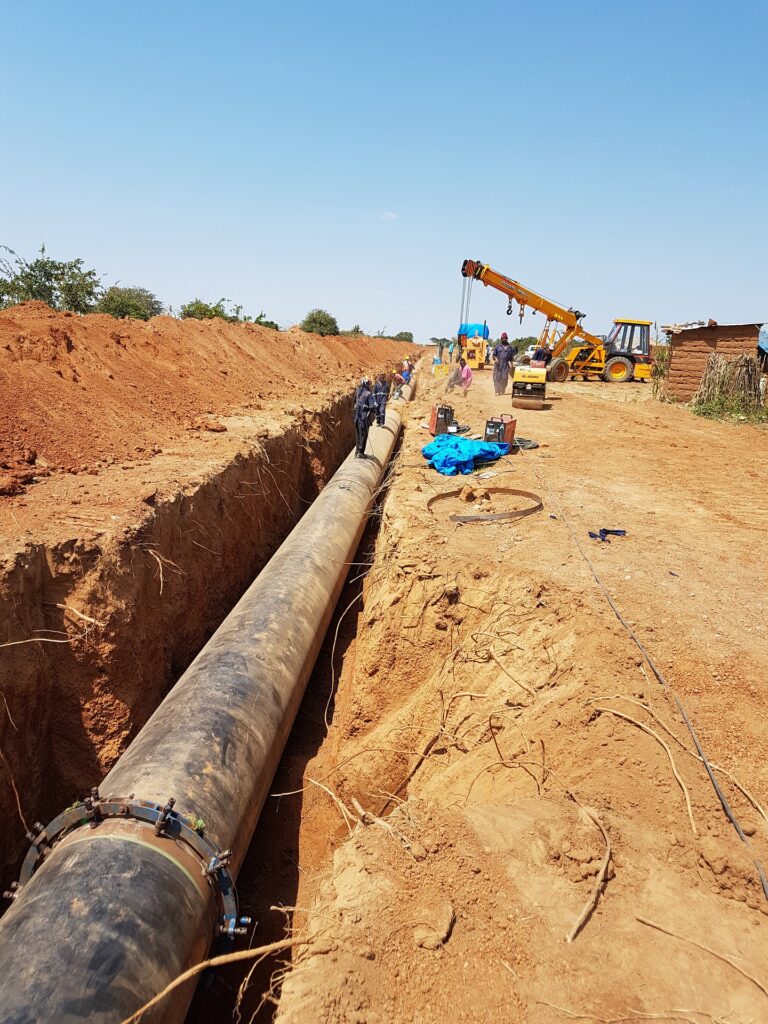Talks to resume the construction of the proposed trans-Saharan gas pipeline whose length spans in excess of 4000 km, have been initiated by Algeria, hoping to complete the pipeline that would transect two West African Nations, Nigeria and Niger. Much of the preliminary stages which include project layout and route specifications have been completed by the Algerian State-owned oil firm Sonatrach but are yet to reach a compromise with the involved nations.
The grandiose Trans-African gas pipeline is an ambitious project that was conceptualized in the 1970s to ease gas conveyance from Nigeria to Algeria, as well as expand and variegate European Union’s gas supplies. The project however hit a hiatus due to inhibitions from green activists calling for the preservation of Niger’s River delta and militant organizations threatening the crew members working on the gas pipelines.
The abstraction of the Trans-Saharan gas pipeline, also known as the NIGAL pipeline or Trans-African gas pipeline, was formed way back in the 1970s, but only witnessed project progress on the 14th of January 2002 as the Nigerian National Petroleum Corporation (NNPC) and Sonatrach, signed an MoU towards the preparation of the project. In June 2005, a feasibility study was deemed necessary as NNPC and Sonatrach outsourced a project study contract to Penspen Limited, whose findings in 2006 proved the pipeline’s competent technicality, reliability, and potential economical assertiveness.
With the initiative set in motion, NNPC and Sonatrach agreed to move forward with the draft Memorandum of Understanding uniting the governments of the nations in a joint venture agreement at a meeting on February 20, 2009, with Nigeria, Niger, and Algeria’s energy ministers finally signing the aforementioned treaty on the pipeline on July 3, 2009, in Abuja.
Although project agreements were proposed mid-year in 2009, its implementation has been long overdue as a result of looming danger signals, particularly with respect to the In Aménas hostage crisis of 2013. In recent month, shouts to revisit the project has become loud as the development of the Ajaokuta–Kaduna–Kano phase of the Trans Nigeria Gas Pipeline culminated between the years 2019 and 2020, stimulating the Nigerian National Petroleum Corporation’s projection of the construction of the 4400-kilometer Trans-Saharan Gas Pipeline.
The Trans Saharan Gas Project pipeline picks source in Nigeria and runs 4,400 kilometers in length to Algeria through Niger, rendering it the world’s longest planned pipeline. The inland pipeline’s operation has been forecasted to commence imminently, by end of the year 2021 possibly, although it was initially scheduled to operate in the year 2015. For a comprehensive Capital Expenditure of US $12 billion, the lengthy conduit will be equipped with a 30 billion cubic meter annual capacity of natural gas.
Trans-Saharan Natural Gas Consortium functions as the operator with a triad of shareholders in Nigerian National Petroleum Corporation (with 45% shares), Republic of Niger (with 10% shares), and Sonatrach SPA (with 45% shares). A host of conglomerates including India’s GAIL, Eni S p A from Italy, France’s Total S.A., and the Royal Dutch Shell have flirted with cooperating with the project, however, Gazprom gas company from Russia, have been the first to initiate contact with Nigeria in a bid to liaise on the project.
Reports suggest the involved nations are keen to domesticate the project with a preference not to include international oil organizations if need not be. The energy ministers of Algeria and Nigeria have remarked that that “if things go well, there will be no need to bring international oil companies into the project”. The pipeline would stretch 4,128 kilometers long, with 1,037 kilometers in Nigeria, 841 kilometers in Niger, and a further 2,310 kilometers in Algeria.
It will originates in Nigeria’s Warri region and will travel north through Niger to Algeria’s Hassi R’Mel. It will connect to the Trans-Mediterranean, Maghreb–Europe, Medgaz, and Galsi pipelines in Hassi R’Mel which supply to Europe from gas transmission hubs on Algeria’s Mediterranean coast including El Kala and Beni Saf.
A memorandum between Morocco and Nigerian is in place for the construction of the Nigeria-Morocco Gas Pipeline, which will supply natural gas across 11 West African nations, through Morocco to Spain. Algeria’s former Interior Minister and ex-Ambassador Abderrahmane Meziane Cherif recently hinted at the need to speed up an agreement to pursue the Trans-Saharan Gas Project, over the Nigeria-Morocco Gas Pipeline agreement.
Other concerns for the project is the Nigerian militant Movement for the Emancipation of the Niger Delta, which opposes the pipeline strongly. The group’s actions are aimed at reducing oil production in the Niger-Delta region, claiming to expose manipulation and exploitation of Niger-Delta residents. There have been concerns of the perceived environmental degradation earned as a ripple effect of the public-private partnerships between the Federal Government of Nigeria and corporations involved in the production of oil in the Niger Delta.
The desire to complete the impending project has been continuously displayed as the Nigerian government committed the US $400 million to kick-start the project and the additional US $450 million Eurobonds in 2014 and perhaps tenable as the pipeline will aim to promote harmony and seamless integration between neighboring countries, allowing Nigeria’s natural gas export route to be diversified and marketed.











